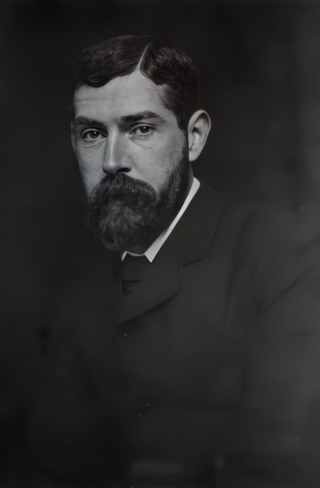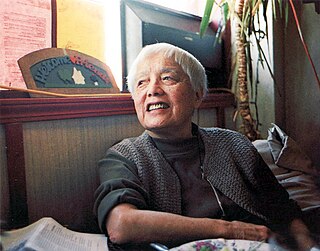Related Research Articles

William Payne Alston was an American philosopher. He is widely considered to be one of the most important epistemologists and philosophers of religion of the twentieth century, and is also known for his work in metaphysics and the philosophy of language. His views on foundationalism, internalism and externalism, speech acts, and the epistemic value of mystical experience, among many other topics, have been very influential. He earned his PhD from the University of Chicago and taught at the University of Michigan, Rutgers University, University of Illinois, and Syracuse University.
Dialectic, also known as the dialectical method, refers originally to dialogue between people holding different points of view about a subject but wishing to arrive at the truth through reasoned argument. Dialectic resembles debate, but the concept excludes subjective elements such as emotional appeal and rhetoric. It has its origins in ancient philosophy and continued to be developed in the Middle Ages.

Charles Margrave Taylor is a Canadian philosopher from Montreal, Quebec, and professor emeritus at McGill University best known for his contributions to political philosophy, the philosophy of social science, the history of philosophy, and intellectual history. His work has earned him the Kyoto Prize, the Templeton Prize, the Berggruen Prize for Philosophy, and the John W. Kluge Prize.

William Lane Craig is an American analytic philosopher, Christian apologist, author, and Wesleyan theologian who upholds the view of Molinism and neo-Apollinarianism. He is a professor of philosophy at Houston Christian University and at the Talbot School of Theology of Biola University.

A subset of absolute idealism, British idealism was a philosophical movement that was influential in Britain from the mid-nineteenth century to the early twentieth century. The leading figures in the movement were T. H. Green (1836–1882), F. H. Bradley (1846–1924), and Bernard Bosanquet (1848–1923). They were succeeded by the second generation of J. H. Muirhead (1855–1940), J. M. E. McTaggart (1866–1925), H. H. Joachim (1868–1938), A. E. Taylor (1869–1945), and R. G. Collingwood (1889–1943). The last major figure in the tradition was G. R. G. Mure (1893–1979). Doctrines of early British idealism so provoked the young Cambridge philosophers G. E. Moore and Bertrand Russell that they began a new philosophical tradition, analytic philosophy.

The Kyoto School is the name given to the Japanese philosophical movement centered at Kyoto University that assimilated Western philosophy and religious ideas and used them to reformulate religious and moral insights unique to the East Asian philosophical tradition. However, it is also used to describe postwar scholars who have taught at the same university, been influenced by the foundational thinkers of Kyoto school philosophy, and who have developed distinctive theories of Japanese uniqueness. To disambiguate the term, therefore, thinkers and writers covered by this second sense appear under The Kyoto University Research Centre for the Cultural Sciences.
Raya Dunayevskaya, later Rae Spiegel, also known by the pseudonym Freddie Forest, was the American founder of the philosophy of Marxist humanism in the United States. At one time Leon Trotsky's secretary, she later split with him and ultimately founded the organization News and Letters Committees and was its leader until her death.
African philosophy is the philosophical discourse produced using indigenous African thought systems. African philosophers are found in the various academic fields of present philosophy, such as metaphysics, epistemology, moral philosophy, and political philosophy. It discusses substantive issues from an African perspective.

Chris Matthew Sciabarra is an American political theorist born and based in Brooklyn, New York. He is the author of three scholarly books—Marx, Hayek, and Utopia; Ayn Rand: The Russian Radical; and Total Freedom: Toward a Dialectical Libertarianism—as well as several shorter works. He is also the co-editor, with Mimi Reisel Gladstein, of Feminist Interpretations of Ayn Rand and co-editor with Roger E. Bissell and Edward W. Younkins of The Dialectics of Liberty: Exploring the Context of Human Freedom. His work has focused on topics including Objectivism, libertarianism, and dialectics.

Marilyn McCord Adams was an American philosopher and Episcopal priest. She specialized in the philosophy of religion, philosophical theology, and medieval philosophy. She was Horace Tracy Pitkin Professor of Historical Theology at Yale Divinity School from 1998 to 2003 and Regius Professor of Divinity at the University of Oxford from 2004 to 2009.
Daniel A. Dombrowski is an American philosopher and professor emeritus of philosophy at Seattle University. He has served as editor of the journal Process Studies since 2009, and is a past president of the Metaphysical Society of America (2018–19).
Feminist philosophy is an approach to philosophy from a feminist perspective and also the employment of philosophical methods to feminist topics and questions. Feminist philosophy involves both reinterpreting philosophical texts and methods in order to supplement the feminist movement and attempts to criticise or re-evaluate the ideas of traditional philosophy from within a feminist framework.
Women have made significant contributions to philosophy throughout the history of the discipline. Ancient examples of female philosophers include Maitreyi, Gargi Vachaknavi, Hipparchia of Maroneia and Arete of Cyrene. Some women philosophers were accepted during the medieval and modern eras, but none became part of the Western canon until the 20th and 21st century, when some sources indicate that Simone Weil, Susanne Langer, G.E.M. Anscombe, Hannah Arendt, and Simone de Beauvoir entered the canon.
William S. Hatcher (1935–2005) was an American mathematician, philosopher, educator and a member of the Baháʼí Faith. He held a doctorate in mathematics from the University of Neuchatel, Switzerland, and bachelor's and master's degrees from Vanderbilt University in Nashville, Tennessee. A specialist in the philosophical alloying of science and religion, for over thirty years he held university positions in North America, Europe, and Russia.
Ernan McMullin was an Irish philosopher who last served as the O’Hara Professor of Philosophy Emeritus at the University of Notre Dame. He was an internationally respected philosopher of science who has written and lectured extensively on subjects ranging from the relationship between cosmology and theology, to the role of values in understanding science, to the impact of Darwinism on Western religious thought. He is the only person to ever hold the presidency of four of the major US philosophical associations. He was an expert on the life of Galileo.
John Herman Randall Jr. was an American philosopher and educator.

James Brusseau is a French philosopher specializing in contemporary Continental philosophy, history of philosophy and ethics. In 1994, Brusseau joined the faculty of Philosophy and Letters at the Mexican National University in Mexico City teaching graduate courses in philosophy and comparative literature. He has also taught in Europe and the California State University. Currently he teaches at Pace University in New York City. Brusseau took a Ph.D. in Philosophy under the direction of Alphonso Lingis He is currently a professor at Pace University in New York City. He is married to a Spaniard and has two children.

Philosophy is a systematic study of general and fundamental questions concerning topics like existence, reason, knowledge, value, mind, and language. It is a rational and critical inquiry that reflects on its methods and assumptions.

Grace Lee Boggs was an American author, social activist, philosopher, and feminist. She is known for her years of political collaboration with C. L. R. James and Raya Dunayevskaya in the 1940s and 1950s. In the 1960s, she and James Boggs, her husband of some forty years, took their own political direction. By 1998, she had written four books, including an autobiography. In 2011, still active at the age of 95, she wrote a fifth book, The Next American Revolution: Sustainable Activism for the Twenty-First Century, with Scott Kurashige and published by the University of California Press. She is regarded as a key figure in the Asian American, Black Power, and Civil Rights movements.
Debra Nails is an American philosophy professor who taught at Michigan State University. Nails earned her M.A. in philosophy and classical Greek from Louisiana State University before going on to earn a Ph.D. in philosophy at the University of the Witwatersrand, Johannesburg in 1993. Previously, she taught in the Department of Classics, Philosophy, and Religion at Mary Washington College. Nails taught courses on the history of philosophy, continental rationalism, metaphysics, and modern philosophy.
References
- ↑ Michigan State University Philosophy Department/John McClendon accessed May 30, 2011.
- 1 2 Fayetteville University Documents Archived 2011-07-23 at the Wayback Machine ; accessed May 30, 2011.
- ↑ Reviews of C. L. R. James's Notes on Dialectics: Paget Henry, The CLR James Journal, doi : 10.5840/clrjames200713120; Peter Hudis, Socialism and Democracy, ; J. R. Kerr-Ritchie, J. African American History, JSTOR 20064184
- ↑ Review of Philosophy of Religion and the African American Experience: Anthony Sean Neal, Black Theology, doi : 10.1080/14769948.2018.1411757
- ↑ Review of African American Philosophers and Philosophy: Kate Korycki, Ethnic and Racial Studies, doi : 10.1080/01419870.2019.1707845
- ↑ Review of Black Christology and the Quest for Authenticity: Sameer Yadav, Faith and Philosophy, doi : 10.37977/faithphil.2020.37.2.9